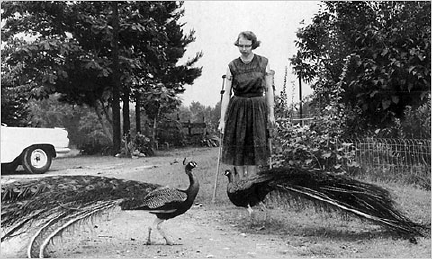I am tired of reading reviews that call A Good Man brutal and sarcastic. The stories are hard but they are hard because there is nothing harder or less sentimental than Christian realism... when I see these stories described as horror stories I am always amused because the reviewer always has hold of the wrong horror. ~Flannery O'ConnorMany critics of Flannery O'Connor "have hold of the wrong end of the horror", wondering what could be wrong with the gal for her to write about things so "grotesque" and "disturbing"! On the other hand (for there are two!) "her work is praised, fawned over, and cleverly ignored through tiresome academic gobbledygook..." (Failed Hermit). It seems as though neither group is able to (or wants to) recognize Jesus as the hero of O'Connor's stories (as Robert Drake puts it) and we, all of us, are in need of being changed by grace. John Desmond in his book Risen Sons
In one of her letters, O'Connor writes, "All human nature vigorously resists grace because grace changes us and the change is painful." Desmond says, "By denying his true spiritual grotesqueness man also denies his possibility for becoming the New Man through spiritual transformation and transcendence." However, "Even those characters who reject the threatening possibility of a higher mode of existence paradoxically achieve a partial transcendence through loss...brought about by their violent displacement from a former mode of existence."
O'Connor's style is summed up in something Eliade said about his own writing, "In my own stories I have found that violence is strangely capable of returning my characters to reality and preparing them to accept their moment of grace. Their heads are so hard that almost nothing else will do the work. This idea, that reality is something to which we must be returned at considerable cost, is one which is seldom understood by the casual reader, but it is one which is implicit in the Christian view of the world."
Not everyone is comfortable with being changed by grace. One doesn't like to pull back the curtain, as it were, and see one's own freakishness. "Whenever I’m asked why Southern writers particularly have a penchant for writing about freaks, I say it is because we are still able to recognize one."(O'Connor) Can we recognize it? Are we ready for even "our virtues to be burned away"? Can we stop pushing away redemption at the cost of the self-sufficiency we think we have? Do we believe, as Desmond says, "that we can achieve wholeness exclusive of the divine"? If so, that is truly grotesque. And we are "in need of being disturbed." (Failed Hermit)
"If the promise of the Resurrection seems muted in O'Connor's world, it is because that world has denied it."(Joyce Oats) Read O'Connor's stories and see that they are full of Christ's Incarnation, Crucifixion, and Resurrection. Recognize that she uses "the grotesque...because people are deaf and dumb and need help to see and hear."(O'Connor)
More bits of wisdom from Miss Flannery:
"The novelist with Christian concerns will find in modern life distortions which are repugnant to him, and his problem will be to make them appear as distortions to an audience which is used to seeing them as natural; and he may be forced to take ever more violent means to get his vision across to this hostile audience. When you can assume that your audience holds the same beliefs you do, you can relax a little and use more normal ways of talking to it; when you have to assume that it does not, then you have to make your vision apparent by shock — to the hard of hearing you shout, and for the blind you draw large and startling figures."
"Anything that comes out of the South is going to be called grotesque by the northern reader, unless it is grotesque, in which case it is going to be called realistic.
"I think it is safe to say that while the South is hardly Christ-centered, it is most certainly Christ-haunted."
"The truth does not change according to our ability to stomach it."
"You shall know the truth and the truth shall make you odd."
"Only if we are secure in our beliefs can we see the comical side of the universe."
"The Catholic novelist in the South will see many distorted images of Christ, but he will certainly feel that a distorted image of Christ is better than no image at all. I think he will feel a good deal more kinship with backwoods prophets and shouting fundamentalists than he will with those politer elements for whom the supernatural is an embarrassment and for whom religion has become a department of sociology or culture or personality development."


4 comments:
You know the question, "Who is someone dead or alive that you would like to have lunch with?" She's one of mine.
Yes!
I think this best describes Ms. O'Connor's work: "to the hard of hearing you shout, and for the blind you draw large and startling figures."
Also, I like and identify with "the truth shall make you odd" so that's my excuse! :)
Mine too, because it's true!
Post a Comment